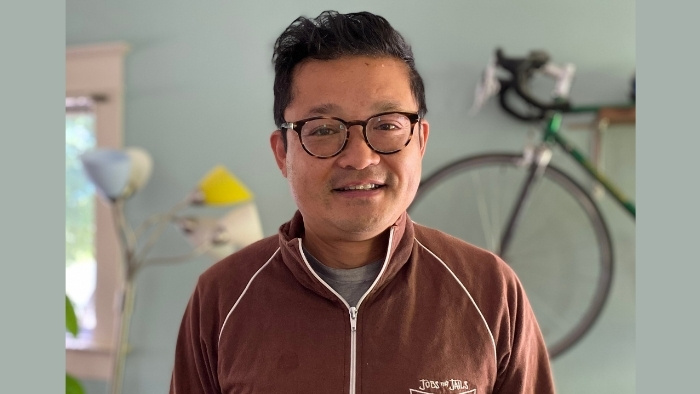The Portland-based Jubilee Fund raised $100,000 to eliminate credit card debt for eight neighbors. The individuals who had their debts paid off then became donors, making payments to reparations efforts for five years with 0% interest.

What would it look like to build equity and trust by freeing our neighbors from debt? How could we organize a community so that everyone could live with a sense of abundance? What if we could create a model that both liberates and lets money flow to where it is most needed?
Douglas Tsoi is one step closer to having an answer to these questions, thanks to the Jubilee Fund, a project he founded in 2020. Tsoi gathered 12 funders in the Portland, Oregon metro area who collectively agreed to donate $100,000 to eliminate credit card debt for eight of their neighbors. The individuals who had their debts paid off then became donors, making payments to reparations efforts for five years with 0% interest.
“Usually interest is the bond, and trust is the bond here,” Tsoi said. “My whole goal is to help people participate in grace. Giving people money to pay off their debt is a form of grace. And we’re also allowing them to participate in grace, because they’ve turned from being a debtor to a donor.”
The Jubilee Fund provides debt relief to donors while keeping money in the local economy by giving to reparations-based organizations of the funders’ choosing. By doubling the benefit of donations, the Jubilee Fund expands on the typical giving model by bringing a sense of wholeness to both donors and debtors, Tsoi said. He emphasized that surrendering the funds to marginalized groups is an essential piece of the model, in that it repairs and sustains a sense of community, especially for people who have had systems work against them.
And yet, viewed through Tsoi’s expansive lens, the crux of the Jubilee Fund isn’t necessarily in the outcome, but in the grace flowing through the project regardless of its results.
“You just do what you think is right. And then you know, you try your best not to get caught up with whether it succeeds or fails,” Tsoi said.
In his Substack newsletter, Tsoi writes that he knows that the Jubilee Fund will work “when people feel like they have enough, when people feel like they are enough, and when people realize that real wealth resides in a set of community goods that no individual can own.”
Having tapped his personal network for this pilot project, Tsoi said he would like to see other communities adopt a Jubilee Fund model. His ultimate goal is to have the Jubilee Fund replicated by a church, nonprofit organization, large donor or foundation.
“Grace is available to all of us. You have to recognize it. It’s all around us,” Tsoi said. “Hopefully, once you receive it, you realize that part of it is also giving it away. We’re all participating.”
Bringing justice to the daily economy
After building the Jubilee Fund, which is focused on sharing wealth, Tsoi began to think about how to apply the concept on a smaller scale — to create a daily economy that runs on grace.
When our society talks about reparations or racial justice, we often think that action comes only in the form of individual donations, protesting, and sharing information, Tsoi said, but he wondered what reparative justice could look like in the daily economy.
“How do you actually offer your own gifts, your expertise?” Tsoi said. “How do we create an inclusive economy without having to ask for permission?”
This reflection led Tsoi to found the Reparations Underground Market, an online marketplace where vendors offer services, like copyediting, business coaching, and cooking lessons, and all proceeds go to reparations efforts. When a service is purchased, the vendor chooses where half of the donation cost goes, and the buyer selects from a drop-down menu of organizations where to donate the other half.
The website offers seven organizations to choose from, including an Indigenous-led mutual aid network, a land trust organization that benefits Black farmers in Oregon, and a nonprofit supporting African refugee and immigrant women and their families.
A life built on participating in grace
Tsoi spends his days helping others find financial freedom after retiring at age 42. For twenty years, Tsoi worked as a lawyer, educator, and entrepreneur, living frugally and saving half of his salary.
Tsoi is both a lifelong student and teacher, citing the influence of mentors and authors including Fr. Gregory Boyle, Charles Eisenstein, and Lynne Twist, among others. He’s also an alumnus of Faith and Money Network’s Money, Faith and You study group.
His experience with Faith and Money Network humbled him, he said, because he was thinking about financial freedom and personal giving alongside people who had saved far less money than he had and yet were also giving away much of their own wealth.
“How you spend your money is intimately connected to how you live your life,” Tsoi said. “People in my class had either made less money or had less savings than me, but they live in God’s economy already. It was humbling, because they were participating in grace in a completely different way.”
Tsoi said that while he takes his role as a participant in grace seriously, he also knows that he succeeds when he approaches his work with some lightheartedness.
He recalls the words of Archbishop of Canterbury Rowan Williams: “See what God is doing and join in.”
“I’m just trying to participate in what God would do,” Tsoi said. “On some level, we’re just playing, right? We’re just God’s children trying to play this game of life. And I get to see if this game that I’m trying to play works.”
Learn more about the Jubilee Fund or shop the Reparations Underground Market.
By Brittany Wilmes | June 21, 2022
Brittany Wilmes is a freelance writer, project manager and strategic consultant based in Portland, Oregon.